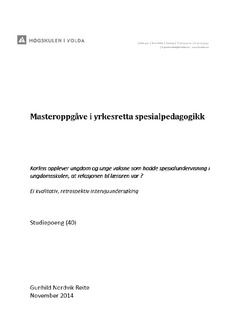Korleis opplever ungdom og unge vaksne som hadde spesialundervisning i ungdomsskulen, at relasjonen til læraren var? Ei kvalitativ, retrospektiv intervjuundersøking
Master thesis
Permanent lenke
http://hdl.handle.net/11250/279139Utgivelsesdato
2014Metadata
Vis full innførselSamlinger
Sammendrag
Summary
The topic of this master thesis is the relationship between teacher and students with special education. Extensive research shows that this relationship is crucial to the students’ learning and development, especially for students at risk of school failure. The research question for this study has been: How do former students who had special education in lower secondary school (8th – 10th grade) perceive the relationship they had with the teacher at the time? To find answers to this research question, qualitative, retrospective interviews have been conducted amongst former students, who had special education in lower secondary school.
The results in this study are being presented within the framework of a model I have called the triadic model for teacher – student relationships. This is a model which is based on the classic didactic triangle, and presents the teacher – student relationship as a triangle with three equal factors: student, teacher and curriculum. The good relationship is presented as a balanced meeting between these three.
In a good relationship the infomants have perceived the teacher as authoritative, strict and just, with a good relationship with the class as a group. The teacher was caring, and adapted the teaching to the students’ needs. The students felt that they were seen, both academically and as human beings, and became motivated and committed. The teacher had to some students a function as a primary attachement figure, and it is consistent that this teacher mediated attachement to school. The good relationship led to academic and personal development for the students, and affected how later schooling was perceived.
In a poor relationship the informants have perceived the teacher as authoritarian or neglective. The teacher did not give neither instrumental nor emotional support, and did not adapt the teaching to the students. The students felt neglected or counteracted, became demotivated, they resigned and experienced a negative academic development. Some informants tell about how a good relationship to another teacher later neutralized the experience, and reversed the negative development.
The results in this study are consistent with previous research, and underlines especially the connection between the more emotional side of the teacher – student relationship, and the academic activity in schools. The study also points to how a positive relationship to a teacher by some former students has been perceipved as crucial to a positive development both personally and academically later in life. Samandrag
Temaet for denne studien er relasjonen mellom læraren og elevar med spesialundervisning. Omfattande forsking viser at denne relasjonen er avgjerande for eleven si læring og utvikling, særleg for elevar som er i risiko for nederlag i skulen. Problemstillinga har vore: Korleis opplever ungdom og unge vaksne som hadde spesialundervisning i ungdomsskulen, at relasjonen til læraren var? For å finne svar på problemstilinga, har det blitt gjennomført kvalitative, retrospektive intervju blant tidlegare elevar som hadde spesialundervisning då dei gjekk i ungdomsskulen.
Resultata i undersøkinga vert presenterte innanfor ramma av ein modell eg kallar ein triadisk modell for lærar – elev - relasjonen. Dette er ein modell som tek utgangspunkt i den klassiske didaktiske trekanten og som framstiller også lærar – elev-relasjonen som ein trekant med tre likeverdige faktorar: elev, lærar og innhald. Den gode relasjonen vert framstilt som eit balansert møte mellom desse tre faktorane.
Den gode relasjonen, slik dei intervjua opplevde den, var prega av ein lærar som var autoritativ, streng og rettferdig, hadde ein god relasjon til klassen som gruppe, viste omsorg for og tilpassa undervisninga til elevane. Elevane kjende seg sett både fagleg og som menneske, og vart motiverte og engasjerte. Læraren fungerte for nokre som ein betydeleg tilknytningsfigur, og det er gjennomgåande at ein slik lærar medierte tilknytning til skulen. Den gode relasjonen til læraren førte til fagleg og personleg utvikling for elevane, og påverka korleis seinare skulegang vart opplevd.
Den dårlege relasjonen, slik dei intervjua opplevde den, bar preg av ein lærar som anten var svært autoritær eller forsømande. Ho gav verken fagleg eller emosjonell støtte, og tilpassa ikkje undervisninga til elevane. Elevane kjende seg oversett eller motarbeidde, vart demotiverte, dei resignerte, og opplevde negativ fagleg utvikling. Nokre fortel korleis ein god relasjon til ein annan lærar seinare verka nøytraliserande, og snudde den negative utviklinga.
Resultata i undersøkinga er i samsvar med tidlegare forsking, og understrekar særleg samanhengen mellom den meir emosjonelle sida av lærar – elev-relasjonen, og den faglege verksemda i klasseromet. Undersøkinga peikar også på korleis ein god relasjon til ein lærar for nokre har blitt opplevd som avgjerande for ei positiv utvikling både personleg og fagleg, også seinare i livet.
